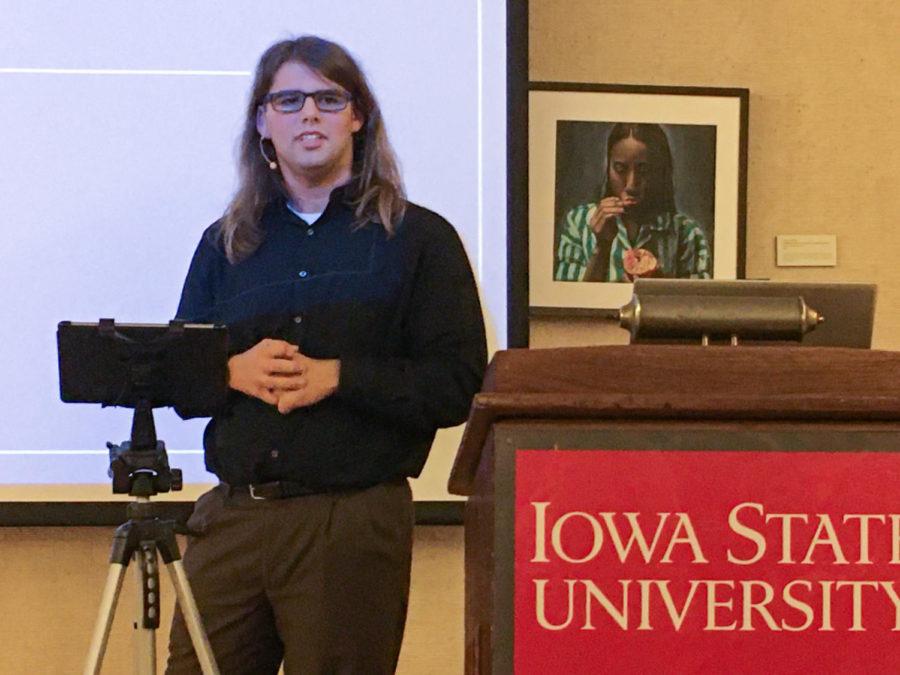Student speaks on living with Tourette syndrome
Morrgan Zmolek/ Iowa State Daily
Trevor Smith, a 17-year-old Iowan with Tourette’s Syndrome, spoke about his journey with the condition and its impacts in the Gallery Room of the Memorial Union.
October 15, 2019
Trevor Smith, 17-year-old president and chairman of the Tourette Advocacy Foundation, his own nonprofit group, presented “My Journey with Tourette’s” Tuesday in the Gallery Room in the Memorial Union.
Smith spoke about the Tourette Advocacy Foundation and how it is aimed at increasing the understanding around Tourette syndrome. Smith also spoke about his own personal journey and challenges associated with his condition.
Three million people have been diagnosed with Tourette syndrome, according to the Center for Disease Control and Prevention (CDC). Half of the people diagnosed with this condition grow out of it by early adulthood — Smith did not.
Smith said Tourette syndrome typically manifests itself at seven years old, and his story at that point was no different.
Smith discovered his hands, neck and eyes would move and twitch involuntarily when he was seven years old.
Smith said his doctor told him it was nothing to worry about and he should grow out of it as he aged. This was the case for Smith’s mother, as she had mild Tourette’s; Smith said he was hopeful he would grow out of it too.
For this reason, he opted out of starting medication when asked by his parents what he wanted to do.
It became apparent as he got into his teens the condition would only get worse for him. The corrective treatment options for Tourette’s consists of three steps: psychological, pharmaceutical and surgical.
They first screened Smith for another coexisting condition that might cause or contribute to his tics — the involuntary movements that come with the condition — as 86 percent of children diagnosed with Tourette’s have at least one additional behavioral, mental or developmental disorder.
Smith is one of the 14 percent with pure Tourette’s with no other conditions.
Smith said with each medication he had side effects that far outweighed any good the medications would do him. One medication caused him to gain over 100 pounds. Smith showed the audience pictures of him with his weight gain.
“It’s emotional for me to see what happened to me because of that medication,” Smith said. “These pictures are not something I’m proud of.”
Smith said he became frustrated with his condition. His tics were causing him neck and back pain and inhibiting his walking, and there was nothing he could do about it. He said he went on to find hope in his disappointment, which was music.
When Smith was 15, he started playing the guitar. He said he found when he played his music, his tics mostly went away. After this discovery, Smith found himself learning everything he could about playing music. He said he found an instrumental and vocal coach to help him both learn about guitar and singing and encourage him to play even when the tics are hard.
Things were not getting better for Smith’s condition. He reached his current level of severity with his tics at 15 years old, and the doctors knew when he was 16 that his condition wouldn’t improve for him. He said none of the medications helped, he had no other conditions and he only had one remaining option: deep brain stimulation surgery.
Deep brain stimulation surgery was for those who didn’t respond to the typical treatments. The procedure consists of two electrodes being placed deep into the brain at predetermined points.
There was only one problem. Due to the experimental aspect of this surgery in the treatment of Tourette’s, the cost of Smith’s surgery was going to total $160,000.
The insurance refused to front the cost of his surgery not once, but three times. All they could do to get the money for it was try to fundraise. The family fundraised for a total of three years and didn’t come anywhere near their total, as most of the help they thought they would receive fell through.
In the fall of 2018, Smith said he began to feel depressed and lonely. Smith said this is not uncommon, as 25 percent of people with Tourette’s will suffer from depression at some point in their lives. Smith said because of his tics, people tended to stay away from him.
“Talking to people can be a challenge,” Smith said. “My tics make people nervous and when I get nervous, my tics get worse.”
He said he knew the surgery was his last shot at regulating his tics, but at that point he didn’t think it would ever be possible. When December of that same year came around he said this prospect turned around for him. A call came from his doctor’s head nurse, telling the family Mayo Clinic wanted to donate 85 percent of the cost for Smith’s surgery.
On Feb. 5, at around 5 a.m, Smith said he arrived at Mayo Clinic in Rochester, Minnesota, to have his surgery. Smith said he’s still experimenting with the groupings or settings predetermined by his doctor to try.
Smith said the severity of his tics has reduced and one of his vocal tics has even subsided.
Through his 17-year journey with his condition, Smith said he has learned to cherish each moment, the good and the bad alike. He said he has learned determination, persistence and hard work will get him through anything.
“Obstacles are opportunities and you reap the benefits of those opportunities,” Smith said. “I am the biggest beneficiary of the hard work I do.”







